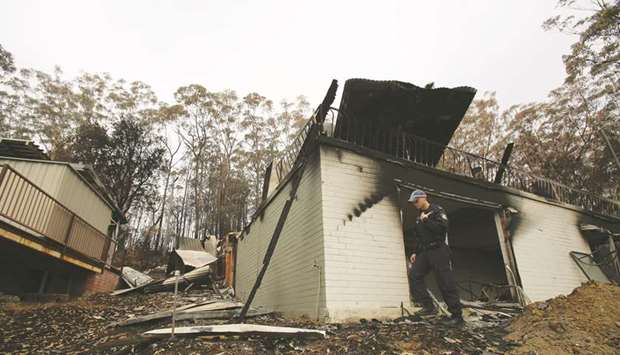Australian firefighters used a break from searing temperatures to strengthen containment lines around huge wildfires burning in the country’s southeast yesterday, as the financial and environmental costs of the crisis mounted.
The latest official data showed that more than 10.3mn hectares (25.5mn acres) of land across the continent - an area the size of South Korea - has been razed by bushfires in recent weeks.
Imagery posted online from the Himawari 8 Japanese satellite and Nasa’s Earth Observatory showed plumes of smoke from the fires reaching as far as South America. Firefighters on the ground were making the most of a few days of cooler temperatures in the southeast of the country to prepare for a forecast return of heat and wind later this week that is expected to spur existing blazes and spark new ones into life.
“We need to remain vigilant,” Andrew Crisp, Victoria state’s Emergency Management Commissioner Emergency Management Commissioner told reporters in an afternoon briefing. “We talk about benign conditions, and the fire is suppressed but it is still there. It is still tinder dry.”
Australia’s bushfire season started earlier than normal this year following a three-year drought that has left much of the country’s bushland vulnerable to fires. Thousands of people have been left homeless, while many in rural towns have spent days without electricity, telecommunications and, in some cases, drinking water. Military-coordinated rescue and support efforts were ongoing.
Prime Minister Scott Morrison, who was due to meet with banking chiefs yesterday, has acknowledged the crisis will have a significant economic impact and on Monday pledged A$2bn ($1.39bn) to a newly created National Bushfire Recovery Agency.
The Insurance Council of Australia increased its estimate for damages claims from the fires to more than A$700mn yesterday, with claims expected to jump further when more fire-hit areas are accessible.
Following are some highlights of what is happening in the Australian bushfires crisis:
* Two men were reported missing in New South Wales yesterday, police said.
* Forty-eight US firefighters are scheduled to arrive in Australia today, officials said, joining 39 of their compatriots already on the ground. A further 18 incident management personnel from the US and Canada will also arrive on Wednesday.
* Prime Minister Morrison said he spoke with US President Donald Trump yesterday, while British Prime Minister Boris Johnson has also offered support.
* Morrison attended the funeral for volunteer firefighter Andrew O’Dwyer. who was killed along with colleague Geoffrey Keaton on Dec 19 after a burnt tree fell in the path of their firetruck, causing it to roll.
* Data released yesterday showed the fires were beginning to have an effect on the economy. The ANZ gauge of consumer confidence fell last week to its lowest level in more than four years, while its job advertisement data recorded the biggest monthly drop in seven months in December.
* Australia’s military were deployed yesterday to help bury an estimated 4,000 dead sheep and cattle, a process authorities want to complete quickly to prevent rotting carcasses from spreading disease.
* Authorities said the number of people calling for urgent medical care in Victoria jumped 51% on Monday as hazardous smoke covered the state.
* There were 137 fires ablaze across New South Wales state, but all were back at the “advice” level, the lowest alert rating.
* Victoria state had 39 fires with 13 “watch and act” alerts.
* Almost 1,600 homes have been destroyed in NSW, Australia’s most populous state, authorities said. In Victoria state, authorities believe 300 homes have been destroyed.
* Insurers have received 8,985 bushfire-related claims in NSW, Victoria, South Australia and Queensland since the Insurance Council of Australia declared a bushfire catastrophe on Nov. 8. The claims are estimated to have a loss value of A$700mn. The council recorded the destruction of 1,838 residential properties so far.
* A backbencher in PM Morrison’s government was criticised for an appearance on the ‘Good Morning Britain’ ITV program during which he said there was no link between climate change and the bushfire crisis. “There is no link, the facts that cause the fires are the drought and the drying of the environment,” lawmaker Craig Kelly said.

A police officer patrols a damaged property during bushfire season in Lake Conjola, Australia.
